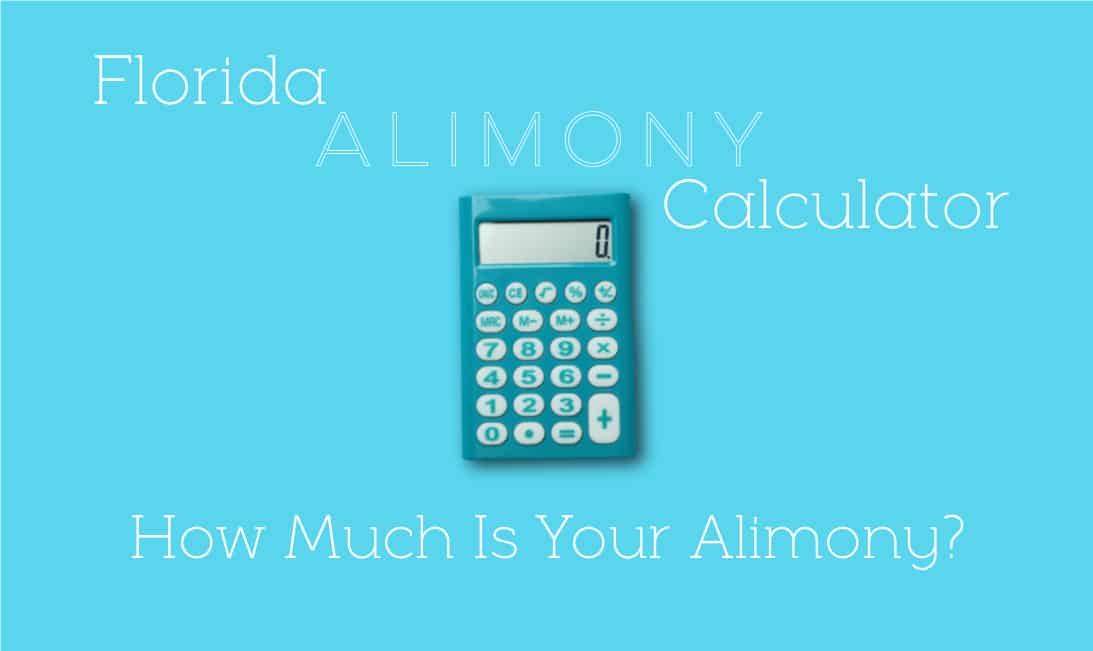As you approach your divorce, it’s normal to be curious about the future of your finances. Will you have to pay alimony to your ex-spouse? How much alimony will you get? How long will it last?
These questions often lead people to a Florida alimony calculator to find out how much they will be receiving (or paying). The problem is that these calculators are not always accurate.
Determining your alimony amount in Florida is a lot more complicated than plugging some numbers into a website and hitting “calculate.” Let’s look at the many factors at play.
Who Pays Alimony In Florida?
Either the husband or the wife may be ordered to pay alimony in a Florida divorce. Whether you pay or receive alimony is determined by something very simple: math.
When determining alimony in a divorce case, a judge looks at many different factors (more on those in a little bit), but ultimately, the question they are asking is whether your income is enough to cover your expenses.
If you have an excess at the end of the month and your spouse doesn’t have enough, you will be paying them alimony. If the situation is reversed, you will be the one receiving alimony.
An alimony award also depends upon the need of the spouse who wants it and the ability of the spouse who is going to actually pay it. Need is determined by how much cash the spouse who wants the support is short each month. Ability to pay is determined by how much surplus cash the spouse who is going to pay the alimony has at the end of each month.
Are FL Alimony Calculators Accurate?
As of the time of this writing (July 2023), alimony calculators you find online are not accurate for Florida divorces.
The reason for this is that we have a new alimony law in Florida, and the law uses other factors to determine how much alimony a spouse is awarded in a divorce.
Over the years, there have been alimony reform bills that have included specific formulas to determine the amount of alimony to be paid. We also have guidelines from a study done by the AAML (American Academy of Matrimonial Lawyers) with a recommended formula.
However, if the Judge in your case won’t be following these guidelines, then alimony calculators aren’t going to do you much good.
This is not to say that you shouldn’t use alimony calculators. In fact, if you are just starting out in your divorce, they can help give you a rough idea of the amount of money you’ll be looking at.
However, once you have that initial estimate, you should definitely take it with a grain of salt.
FL Alimony Factors
Instead of using an alimony calculator or specific formula, the Judge in your divorce case will look at a variety of different factors.
- Does one spouse need alimony?
- Can the other spouse afford to pay alimony?
- What was the standard of living during the marriage?
- What are the anticipated needs and necessities of life for each party after the divorce?
- How long did the marriage last?
- What is the age of each party?
- What is the physical, mental, and emotional condition of each party?
- Do the children have any mental or physical disabilities?
- Was there adultery in the marriage?
- What is each spouse’s earning capacity, educational level, and employability?
- How much did each spouse contribute to the marriage?
- What role will each spouse play in raising the children?
At the end of the day, the law requires that the Judge take into consideration “any other factor necessary to do equity and justice between the parties.”
Types of Alimony in Florida
In addition to determining the amount of alimony in a Florida divorce, the Judge must also decide what type of alimony it will be.
As of July 1, 2023, there are now three main types of alimony in Florida:
Bridge-the-Gap Alimony
Bridge-the-Gap alimony is designed to help one spouse make the transition from being married to being single.
This type of alimony is primarily used when a spouse has specific short-term needs, such as paying off a loan, and may not last longer than two (2) years.
Bridge-the-gap alimony cannot be modified and terminates when one or both parties pass away or the spouse receiving the alimony gets remarried.
Rehabilitative Alimony
Similarly, rehabilitative alimony is designed to help a spouse transition to being single, but there is a greater emphasis on helping them become independent.
For instance, if a stay-at-home spouse needs to go back to school or receive vocational training so they can reenter the workforce, rehabilitative alimony can help.
To receive this type of alimony, you must create a rehabilitative plan, and payments can be modified or terminated if:
- A “substantial change in circumstances” takes place,
- You complete the rehabilitative plan
- You do not comply with the rehabilitative plan.
Durational Alimony
If neither of the previous types of alimony apply, a Judge can grant durational alimony. However, for marriages lasting less than 3 years, durational alimony will not be awarded.
Durational alimony lasts for a set period of time, as determined by the length of the marriage:
- Short-Term Marriages (< 10 years): may not exceed 50% of the length of the marriage
- Moderate-Term Marriages (between 10 and 20 years): may not exceed 60% of the length of the marriage
- Long-Term Marriages (20+ years): may not exceed 75% of the length of the marriage
The amount of durational alimony can be modified based on a change in circumstances, but it is very difficult to change the length of durational alimony and in only exceptional circumstances can it exceed the length of the marriage.
Conclusion
When you are facing a divorce, it can be comforting to know exactly what you can expect when it is all over. Being able to calculate how much alimony you will receive (or owe) can help you budget and mentally prepare for life after divorce.
However, as an Orlando divorce attorney, I caution you against any lawyer, expert, or algorithm that claims they can give you a specific number.
The factors that determine your Florida alimony payments are a lot more complex than you have been led to believe. In my experience, the best way to prepare yourself for the outcome of your specific case is to talk to your attorney.
At Leap Frog Divorce, we put our knowledge and experience to work for you to help guide you through all aspects of your Florida divorce so you know what to expect at every step of the way.
Furthermore, having a qualified attorney on your side from Day 1 can help ensure that your alimony in your divorce is determined fairly.
Call our offices today so we can discuss your needs.




